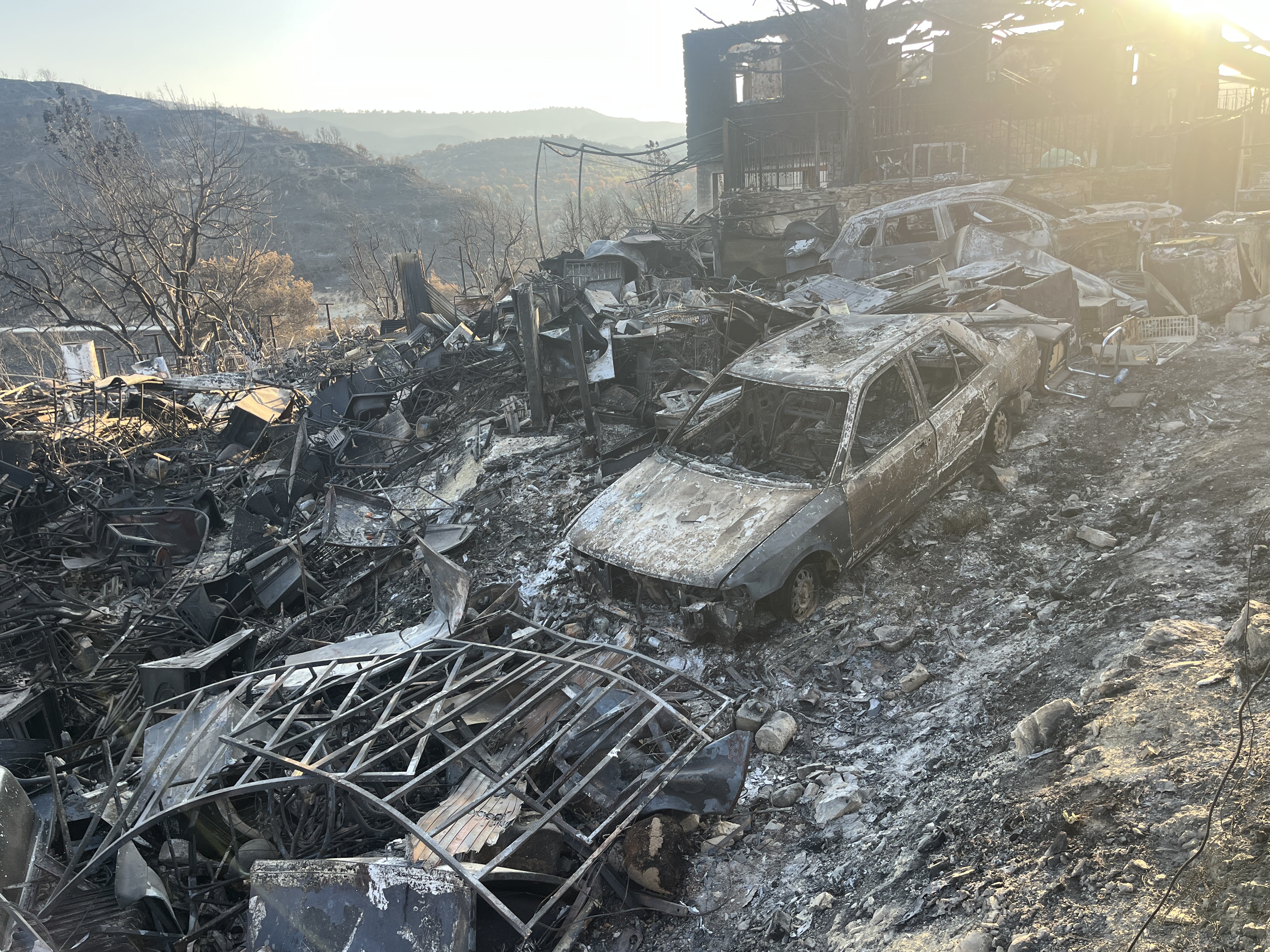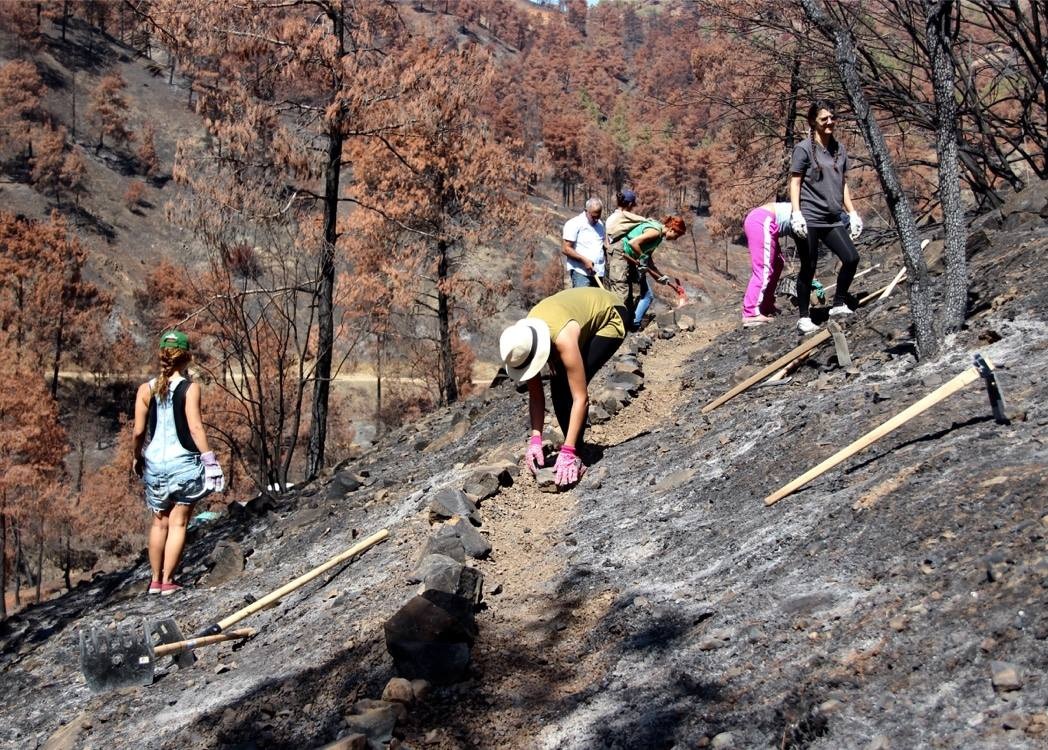Civil society can be a true catalyst for the change we need
By Anastasia Korae
A month has passed since the catastrophic megafire of 23 July 2025 and we have witnessed what seems to be the beginning of its devastating aftermath in Limassol’s wine villages.
Fuelled by prolonged drought, an intense heatwave, and strong winds, the blaze scorched 104 square kilometres of land, according to Eratosthenes Centre of Excellence, Cyprus University of Technology, while the government says 124 square kilometres.
It claimed two lives, caused significant animal losses, and inflicted partial or total destruction on homes, businesses, crops, critical infrastructure, forest and an entire natural system that sustained diverse forms of life.
The immediate reaction is over and the tragedy has already been sidelined by seemingly more pressing concerns, such as reacting to Fidias’ videos. And while countless questions have arisen in all this, the real enduring question is: what happens next, and how do we do it?
A costly and immeasurable toll
The full toll of this disaster on both the environment and human population is immeasurable. Beyond the visible devastation for nature, homeowners, local business owners, and farmers who have seen their livelihoods damaged or destroyed, scientists warn of cascading effects, beginning with the imminent threat of post-fire flash floods.
These floods pose a direct danger to lower-lying communities and will very likely contaminate water resources by washing debris and sediment laden with toxic heavy metals from ash into waterways and essential reservoirs, such as Kouris dam.
Moreover, for surviving wildlife, the loss of food and habitat will cause imbalances and increase susceptibility to disease and pests. Meanwhile, hazardous air quality during and after the crisis, as well as exposure to dangerous materials during cleanup efforts, pose substantial health risks to residents and responders alike.
It’s also crucial to understand the vicious cycle, known as a climate feedback loop. This occurs when the immense carbon released by wildfires creates warmer, drier conditions, which in turn create the conditions for even more frequent and severe infernos in the future. Essentially, fires such as this one worsen the climate and create a self-perpetuating cycle of destruction.
Urgent priorities
Right now, clearly the utmost priority is to support those affected by every possible means and to set urgent priorities for environmental management. Implementing anti-erosion and flood-prevention works before the next rainfalls is critical to mitigate secondary disasters like flash floods.
Additionally, a public-private sector programme for soil rehabilitation, assisted natural regeneration and recovery in general will need to be drawn up and put in practice. There’s no denying that nature’s recovery will be very slow, with vegetation taking up several decades.
Long-term imperative: investment in climate adaptation
Moving forward, Cyprus must invest substantively in bold climate adaptation measures that go well beyond covering emergency actions, compensations and reconstruction.
The scientific projections are alarming: Cyprus will be the most economically harmed by excessive heat in the future among EU countries and ranks as having the highest current and future relative losses. However, if we adopt a proactive and preventive approach through systemic investments, we will avoid overwhelming costs in the long term.

More specifically, according to a recent study by the Cyprus Institute which scrutinised the National Climate Adaptation Strategy, an additional investment of €3.4 billion at today’s prices (or 0.4 per cent of national GDP) up to 2050 is essential to avoid far greater costs.
The study concluded that this estimated amount is not prohibitive for the Cypriot economy and that such adaptation is a necessary investment to safeguard the island’s national security and social well-being, not merely an expense.
A prime example of such a necessary investment is the safeguarding of the Troodos mountain range. As the island’s largest natural carbon sink, its primary water source, and a bastion of unique biodiversity, its health is synonymous with Cyprus’ climate resilience. The recent fire is a stark warning – not protecting it effectively would be an unforgivable failure of foresight.
A wake-up call
This disaster has been a wake-up call for many of the affected and some not-yet affected rural communities, who are now organising themselves to clean up and restore, purchase firefighting vehicles and form coalitions in a bid to be better prepared in the future.
Using some of the lessons on what went wrong this time, they now highlight the need to systematically create and maintain strategic firebreaks around their villages and critical infrastructure, they are working on tackling illegal dumping sites, preparing evacuation plans and considering options regarding modern detection technology that will enable a faster initial response, which is crucial for containing fires before they escalate.
This mobilisation is a collective calling that must now be answered with policy and resources for an island-wide effect.
Civil society can be the true catalyst for transformative change
The path forward cannot be walked by isolated communities working independently, nor by corporations appearing as saviours, nor by the government which is stuck in a frustratingly inefficient way of operating. The true catalyst for transformative change lies within our civil society.
NGOs and active citizens should be integrated into the heart of the planning process, as they are best positioned to identify local vulnerabilities and ensure promises are kept; they can put in practice innovations and test restoration methods; they can communicate the science by bridging the gap between research organisations and the public; they can raise awareness; they can organise volunteers and, ultimately, they can help turn grief into action.
I have a million reasons for pessimism about this country and a thousand more for despair about how this fire was handled by the political leadership before, during and after the crisis.
Yet I cannot help but feel hopeful whenever I hear stories about volunteers who managed to contain the fire with minimal means or whenever I engage with determined people who are already taking meaningful actions on the ground.
These people prove that where leadership fails, citizen action prevails. And this is precisely the driving force that motivates groups such as Friends of the Earth that still remain actively committed to the collective fight for a better world.
Anastasia Korae is the Board President of Friends of the Earth Cyprus






Click here to change your cookie preferences